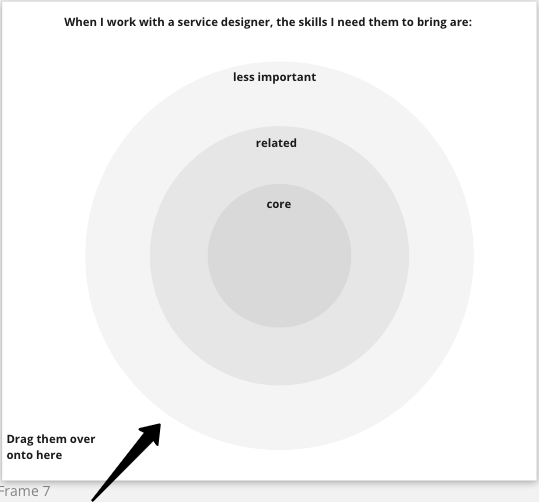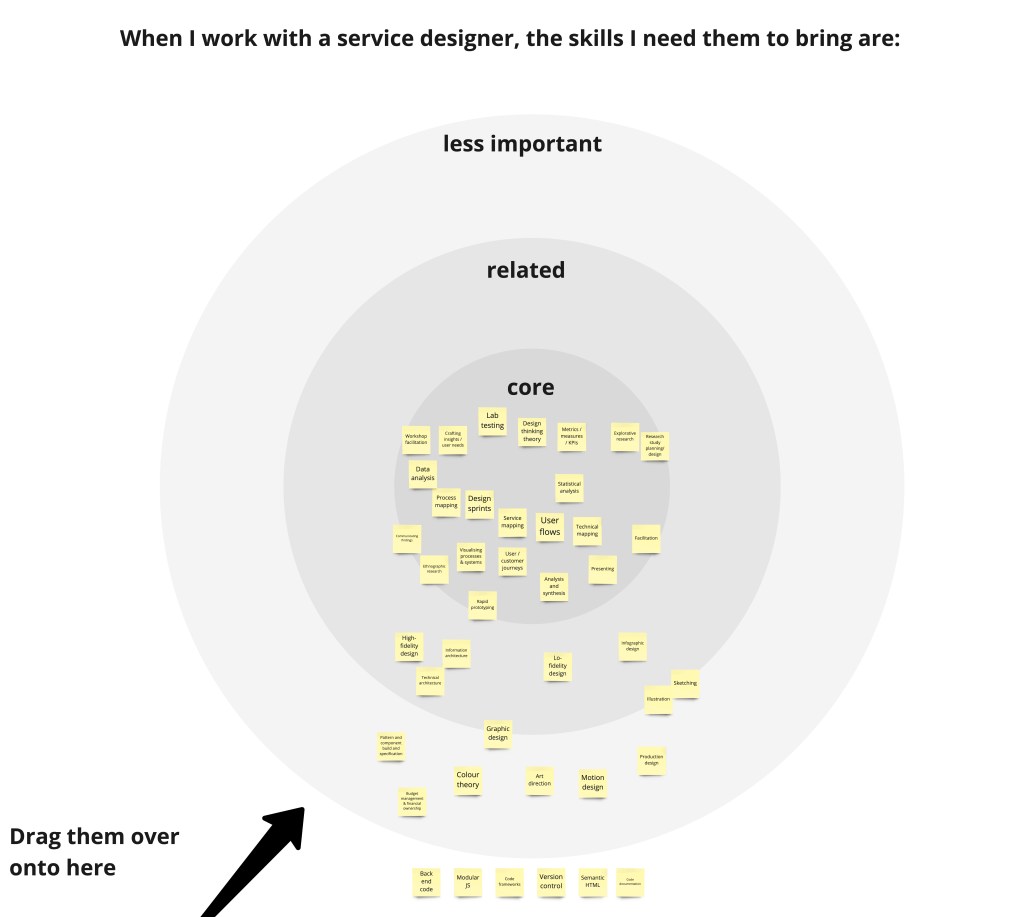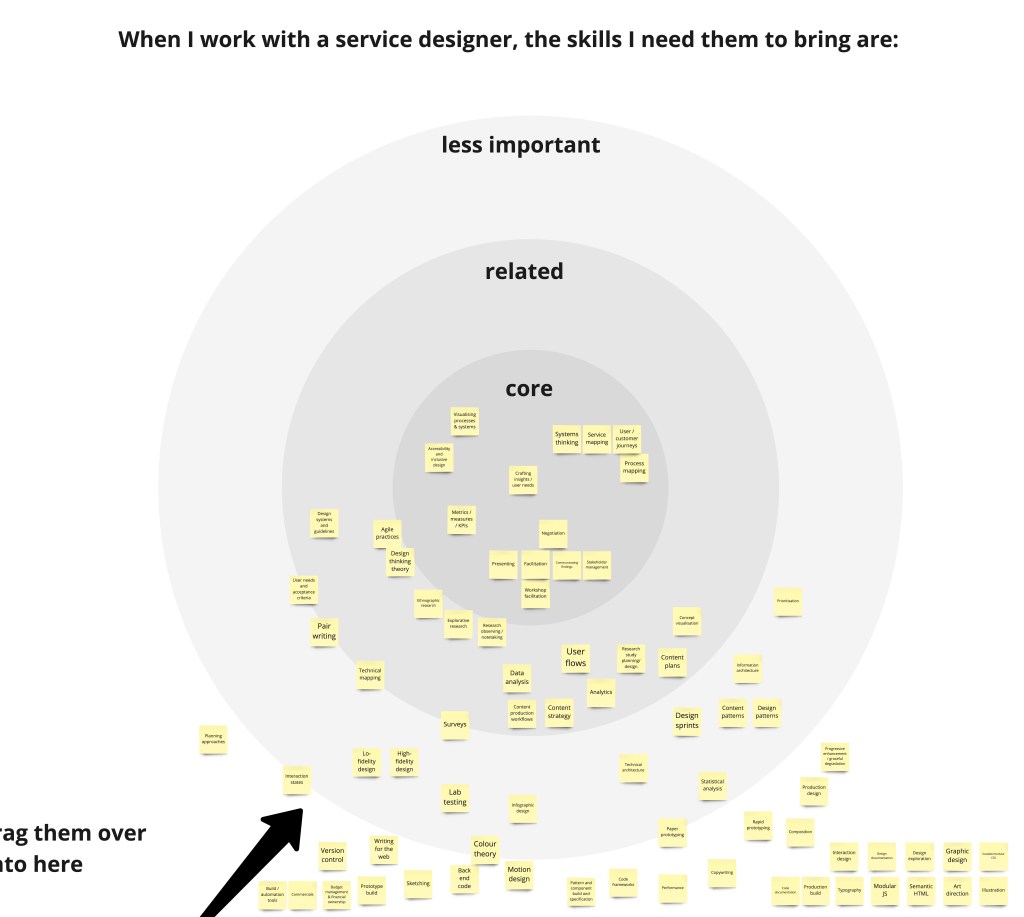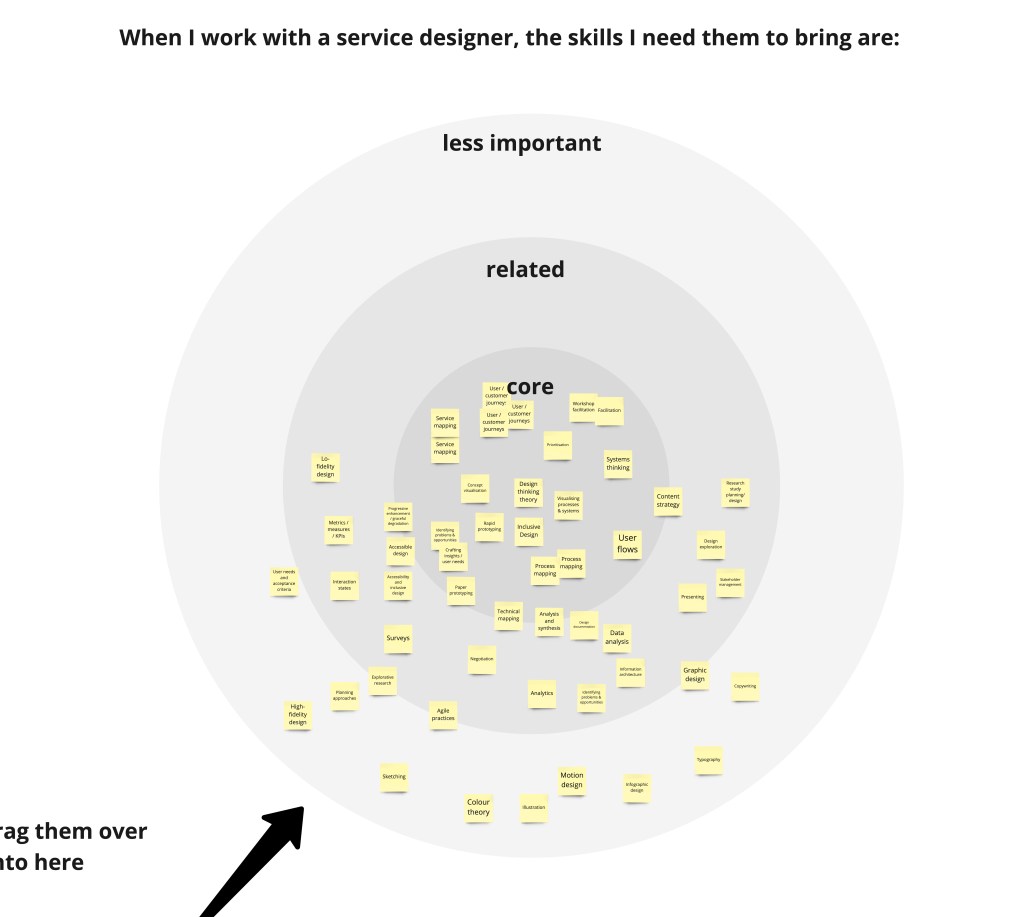Part of my role at Co-op over the last few months has been leading our service design community of practice. I really enjoy planning and facilitating sessions, as well as getting others to contibute and lead too.
One recent session was around the skills that people in our multidisciplinary teams expect service designers to bring to the work. I wanted to help service designers understand what others expected of them and where they may need to focus their development, which we could then plan CoP sessions around. I also wanted to help shape the definition of what being a service designer means at Co-op. Beyond that I just thought it would be interesting, after sharing the outcomes on twitter it seemed others might do to, so I’m writing them up more fully.
The process
After our usual check-in I asked the 18 people present to split into 3 groups of 6. Each group was a mix of UX designers, user researchers, software engineers, learning designers and others. I made sure there was a ‘service designer’ by role in each group to offer support and help guide conversation.
The statement I asked the group to respond to was…
When I work with a service designer, the skills I need them to bring are:
I had provided all the skills that are documented in our current design progression framework. In that framework they’re divided up in individual role types but I removed those categories for this activity to try and remove chance of people just using what was already labelled as service design skills. They could also add any they felt were missing.

I then asked each group to drag the skills onto the ‘skills onion’ I’d created – a butchered version of the ‘team onion’. I wanted them to consider which skills they’d expect as ‘core’, ‘related’, and ‘less important’ to a service design role. I also expected there to be some that didn’t even make it onto these circles at all.

The results
You can see the results of the activity from each group in the images below – or read on for the analysis of it (click to full-screen each image & pan around).



After this initial sort, the final activity I asked the groups to do was identify the 5 top priority skills in their view for a service designer. The results were:
Group 1
- Communicating findings
- Systems thinking
- Identifying problems and opportunities
- Stakeholder management
- Coaching
Group 2
- Identifying problems and opportunities
- Communicating findings
- Analysis and synthesis
- crafting insights and user needs
- Metrics measures and KPIs
- Stakeholder management
- Service mapping
(Some people love to break the rules 😂)
Group 3
- Service Mapping
- User/customer journeys
- Facilitation
- Systems thinking
- Process mapping
- Identifying problems and opportunities
- Crafting insights and user needs
So aside from the fact that we’re not very good at following instructions, there are some interesting themes that started to emerge already.
More analysis
I wanted to try and solidify some of this, so took to excel and dropped in all the skills and started to weight the priority given to each skills by each group. I weighted the results in this way:
Priority skill = 5 points
Core skill = 3 points
Related skill = 2 points
less important = 1 point
I then added up how many points each skills got across the three groups ranking to create an overall ranked list e.g. the skill ‘Identifying problems and opportunities’ was in each groups priority list, so it scored 3×5 points giving it the highest total possible of 15 – it was the only skill to get this score.
Based on this crude ranking system, the top 10 skills the groups expected from service designers were:
- Identifying problems & opportunities
- Systems thinking
- Crafting insights and user needs
- Service mapping
- Stakeholder management
- Workshop facilitation
- Process mapping
- User / customer journeys
- Analysis and synthesis
- Communicating findings
My thoughts
The main thing that jumps out to me is the close relationship expected between service designers and user research type skills. I’d suggest approx 50% of the skills are explicitly related to how we analyse and communicate research output.
- Identifying problems & opportunities
- Crafting insights and user needs
- User / customer journeys
- Analysis and synthesis
- Communicating findings
Of course, these skills are not the exclusive remit of user researchers, but of all other roles we have in Co-op and are common in digital design teams, there is a clear potential overlap between what’s expected of a service designer and a user researcher.
Another thing that stood out was around seniority:
- Stakeholder management
- Workshop facilitation
Whilst again, not the sole domain of senior designers, facilitation and stakeholder management come with experience. It makes me wonder how we set up entry level service designers to succeed with these kind of expectations in teams. Its not something we’ve got right, but it is something we’re thinking about. Notably – all the current service designers (by role title) in Co-op are all at ‘lead’ (or equivalent) level or above currently. What needs to change to make ‘service designer’ a better suited role for those just joining the profession?
Finally one reflection is that there is little in the skils around prototyping or design exploration. Skills like ‘rapid prototyping’ and ‘lo-fi design’ ended up ranked 21 and 23 respectively. This makes me a bit sad. I’m really passionate about the role prototyping plays in a service design process – I’m currently studying it outside of work (which you can read a bit more about if you’re interested) and have been pushing for its use in recent project work too.

How about you? Do you think anything is missing from the list of service design skills the groups arrived at? Let me know on twitter.

Leave a comment